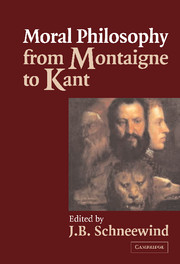Book contents
- Frontmatter
- Contents
- Preface
- Acknowledgments
- Foreword to the One-Volume Reprint
- Introduction
- PROLEGOMENA: SOME QUESTIONS RAISED
- PART I REWORKING NATURAL LAW
- PART II INTELLECT AND MORALITY
- Guillaume Du Vair
- René Descartes
- Benedict de Spinoza
- Nicholas Malebranche
- Ralph Cudworth
- Samuel Clarke
- Gottfried Wilhelm Leibniz
- Christian Wolff
- PART III EPICUREANS AND EGOISTS
- PART IV AUTONOMY AND RESPONSIBILITY
- Supplemental Bibliography
Christian Wolff
Published online by Cambridge University Press: 05 June 2012
- Frontmatter
- Contents
- Preface
- Acknowledgments
- Foreword to the One-Volume Reprint
- Introduction
- PROLEGOMENA: SOME QUESTIONS RAISED
- PART I REWORKING NATURAL LAW
- PART II INTELLECT AND MORALITY
- Guillaume Du Vair
- René Descartes
- Benedict de Spinoza
- Nicholas Malebranche
- Ralph Cudworth
- Samuel Clarke
- Gottfried Wilhelm Leibniz
- Christian Wolff
- PART III EPICUREANS AND EGOISTS
- PART IV AUTONOMY AND RESPONSIBILITY
- Supplemental Bibliography
Summary
Introduction
Christian Wolff was born in Breslau, Germany, in 1679. He studied theology and mathematics and in 1706 was appointed professor of mathematics and natural science at the University of Halle. An early essay of his on the application of mathematical method to practical philosophy won Leibniz's admiration. Leibniz thereafter corresponded with him and sponsored him for various positions, and the philosophy Wolff developed became known as the “Leibniz–Wolff” philosophy. In 1713, while Latin was still the dominant language of the learned world, Wolff began to publish philosophical works in German. The first concerned the powers of the human understanding; it was followed by volumes explaining metaphysics, ethics, politics, cosmology, and teleology (the study of the ends or reasons for the existence of different kinds of things).
With these early German works, Wolff established his reputation as an important systematic thinker, and he also introduced into the German language many philosophical terms that are still in use. Having developed his system in German, Wolff then proceeded to expand and refine it, publishing Latin expositions six or seven volumes long on each of the subjects that he had covered in German in only one volume. He wrote on many other subjects as well. Even in his own lifetime Wolff was reproached for his verbosity, but his Latin works were nonetheless widely read and gave Wolff an international reputation. Indeed, the fact that a long French summary of his work was written especially for women suggests that it was important in fashionable circles, and not only at the universities, to know something about his views.
- Type
- Chapter
- Information
- Moral Philosophy from Montaigne to Kant , pp. 331 - 350Publisher: Cambridge University PressPrint publication year: 2002

